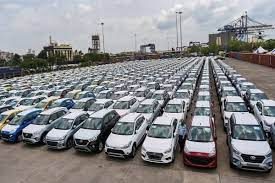States cling to old cars, yet few states really implement trash car disposal laws
After the Center’s fanfare-filled announcement of the Vehicles Scrappage Policy 2021 (VSP) more than two years ago, authorities and industry participants believe a lot of ground still has to be covered in most states before it can be completely implemented for the benefit of the environment, jobs, and money.

The VSP is the first revolutionary, open, and environmentally friendly effort by Union Minister for Road Transport and Highways Nitin Gadkari to organise the Indian scrap industry, with a tonne of incentives and disincentives, and pave the way for “fitter and younger” cars roaring on roads, improving safety and reducing pollution.
Nirmala Sitharaman, the Union Finance Minister, added her support by designating Rs 2,000 crore as Special Assistance for states to shred (government) cars older than 15 years, along with road tax rebates and other concessions to private car owners choosing to purchase new vehicles rather than junking their current vehicles.
“Scrapping of current End of Life Vehicles (ELVs) burden in India can lead to a whopping 15-20% reduction in emissions due to vehicular pollution,” according to the Material Recycling Association of India (MRAI), Mumbai, which has been pushing the problem with the Centre on a regular basis.
“If implemented as a top priority, it can bring over 10 million (one crore) old vehicles for scrapping across the country right away, which will be a boon to various sectors,” said Sanjay Mehta, director of the MTC Group and president of the MRAI.
Of the 28 states and 8 Union Territories, Assam, Bihar, Jharkhand, Karnataka, Mizoram, Madhya Pradesh, Odisha, Punjab, Rajasthan, and Uttar Pradesh have announced road tax or motor vehicle tax incentives, and half a dozen states have announced a one-time waiver of pending liabilities on vehicles older than 15 years that are scrapped at Registered Vehicle Scrapping Facility (RVSF).
RVSFs are now in operation in Assam (2), Andhra Pradesh (2), Chandigarh (1), Gujarat (4, plus authorised 1), Haryana (5), Madhya Pradesh (2), Odisha (1), Punjab (1), Uttarakhand (1), and Uttar Pradesh (9, plus approved 20), according to government statistics.
Following a prodding from Gadkari, Maharashtra, one of the states that allows a one-time road tax waiver, may establish an RVSF in each district, beginning with a plan for Circular Economy Parks in Aurangabad, Raigad, Ratnagiri, and Nagpur with all amenities under one roof.
According to sources in the industry, despite requests from potential investors, states like Kerala, Tamil Nadu, Karnataka, Telangana, West Bengal, Chhattisgarh, Jharkhand, Rajasthan, and others have not yet taken significant moves to establish RVSFs.
An enthusiastic industrialist and investor from Kerala who wants to establish RVSFs in several states, including Maharashtra, Karnataka, and Telangana, confided, “We are ready to make the necessary investments, we have all the other requirements and expertise in place, barring the state government’s guidelines.
A businessman from Kaithal in Haryana said that his group of investors had been pursuing the issue with the state government consistently and that “recently positive movements are seen.” However, he advocated setting priorities “or the state risks falling behind Punjab or Rajasthan.”
According to a federal official, the first investments under the VSP are probably going to be more than Rs 10,000 crore, with the potential to generate over 35,000 employment. In addition, the cascading impact on other related sectors would be much greater, in addition to serving other companies.
According to him, there would be a tonne of opportunity for recovering recyclable components, raw materials for steel companies, and the rubber industry, while vehicle manufacturers can lower manufacturing costs, if more auto salvage yards are established throughout India.
In order to replace the junked cars, increased sales of small, medium, and heavy commercial vehicles would raise the government’s earnings by an estimated Rs 35,000 crore.
Manager Vidyadhar Muley of Bhagyalaxmi Rolling Mills Pvt. Ltd. in Jalna (Maharashtra) said in June that the company has launched an RVSF yard on 2 acres of property and hoped to progressively shred over 50,000 condemned cars each year.
“Such a project may employ 50–100 workers and requires around Rs 10-15 crore for different specialist equipment. About 70% of the metal from a discarded car is used in our steel mill, while the other 30% is distributed to others, according to Muley, speaking to IANS.
In addition, the MRAI has asked Gadkari, the NITI Aayog, and all state governments to swiftly establish policy on RVSF, Automated Testing Stations, disclosing all incentives/tax concessions, and considering strategies to merge conventional car scrap yards with RVSF to the advantage of all stakeholders.
The Bombay High Court has emphasised the necessity to remove decaying jalopies from roads, highways, police stations, and other public spaces, unless necessary for legal reasons. It is interesting to note that the courts have given VSP the green light.







